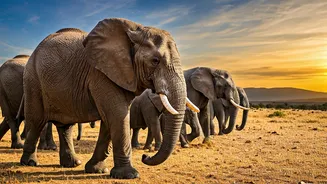Memory's Mighty Power
Elephants showcase extraordinary memory abilities, essential for their survival. Their ability to recognize faces, both familiar and unfamiliar, is a cornerstone
of their complex social structures. They remember locations, vital for migration and finding food and water. This spatial memory enables them to navigate intricate terrains, and revisit resources across long distances. Moreover, elephants retain memories of emotions and past events, which can influence their present-day behavior. These include remembering traumatic experiences, which can guide their responses to potential threats. Their long-term memory also facilitates the transfer of crucial survival knowledge from older, experienced individuals to younger generations, ensuring cultural continuity within their herds. Thus, the power of elephant memory is a key factor in their survival, social dynamics, and the preservation of their cultural knowledge.
Mapping the Landscape
Elephants rely heavily on their impressive spatial memory to navigate their surroundings. They use this remarkable ability to traverse vast distances, often migrating over hundreds of kilometers in search of resources such as food and water. They have an almost intuitive sense of locations and the ability to return to specific sites even after prolonged absence. This skill is critical, allowing them to revisit areas known for plentiful food or safe water sources. Memory guides their decision-making in choosing migration routes, avoiding hazards, and staying connected with their family. Furthermore, elephants can memorize landscape features, such as rivers, mountains, and unique vegetation patterns, aiding them in wayfinding and communication, particularly when they encounter changing seasons. This deep understanding of their environment demonstrates the crucial role memory plays in their survival and overall well-being.
Social Recognition Skills
Elephants display an exceptional ability to recognize individual faces, forming the basis of their intricate social bonds. They can differentiate between members of their extended family and recognize individuals they may not have encountered for several years. This memory allows them to maintain complex social networks, fostering cooperation, and providing support during challenging situations. They are capable of differentiating between familiar and unfamiliar individuals, often displaying distinct behavioral responses based on their recognition. For instance, elephants are known to greet each other with elaborate rituals when they meet after long periods of separation. This recognition extends beyond visual cues, as they also use vocalizations and scents to identify each other. They develop a thorough understanding of their family history, with experience passed down through generations. This social memory strengthens familial bonds, guides the herd’s behavior, and promotes their overall social structure and the success of the species.
Emotional Echoes of Past
Elephants are known for remembering emotional experiences, influencing their current actions. They retain the memory of traumatic events, such as encounters with predators or instances of poaching, and modify their behavior accordingly. When they encounter situations that remind them of past trauma, they exhibit heightened vigilance and caution. They can also recall positive experiences, which may influence their decision-making, such as returning to locations where they once found plentiful food or water. Elephants often exhibit signs of empathy and compassion when encountering other individuals in distress, which may be tied to their emotional memory. This awareness can result in them rallying to protect members of their family, or others, from potential threats, highlighting their complex emotional intelligence. The capacity to retain emotional memories is deeply intertwined with their social behavior and overall wellbeing.
Poaching's Devastating Impact
Poaching has a devastating impact on elephant memory and overall survival. The loss of older, experienced elephants, through poaching, results in the loss of critical knowledge, like migration routes and crucial survival strategies. This creates a gap in the transfer of traditional ecological knowledge, which harms younger generations. The stress associated with poaching causes trauma that can impact their ability to perform their natural behaviors. Elephants who experience or witness poaching also learn to avoid humans. Such negative memories can also alter their social dynamics and survival patterns. The reduction of elephant populations because of poaching also impacts their ability to maintain their cultural traditions, making elephant conservation crucial for preserving their cognitive abilities.














